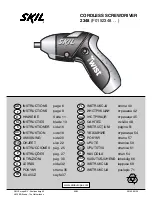
The handset's Speakerphone Speaker is the circular textured area on the back of the handset.
The headset jack is on the left side of the handset, parallel to the TALK button. It has a rubber cover that can be
opened by pulling down, and is not removable.
Base unit
With the base unit facing you, the antennas on the left and right sides of the unit and they can be rotated around
their mounting posts so that they can be positioned pointing upwards whether the unit is on a desk or
wall-mounted. The handset's charging cradle is located on the lower left corner of the unit with an indicator light
to the lower right. This is about 2 inches wide and 1 inch deep. The handset is placed in the cradle with the
handset's buttons facing the front of the base. The unit will beep when the handset is properly placed in the
cradle for charging. The rectangular textured area, toward the back of the unit above the cradle is the speaker.
To the right of the speaker is a smooth rectangular depression. This is the display.
Below the display is a row of 4 thin buttons. The left-most one is the ANSWER ON button with an indicator
light just above it. Immediately to the right is the PRIVACY button with an indicator light just above it. The third
button from the left is the HOLD button. The right-most is the CONFERENCE button.
Below these buttons is a row of 5 round buttons. The left-most is the GREETING button. Immediately to the
right is the MEMO button. To the right of the MEMO button, there are 3 other buttons. From left to right, they
are MAILBOX 1, MAILBOX 2 and MAILBOX 3 buttons. When the Answering System is on, these 3 buttons
control Mailbox Features such as recording and playing back messages.
In the center below these buttons is the NAVIGATOR control, which is a large oval key with an oval depression
in the center. This control has four active areas that are the 12 o'clock, 3 o'clock, 6 o'clock and 9 o'clock positions.
The 12 and 6 o'clock positions are the volume control up and down keys respectively. The 3 and 9 o'clock
positions are the message skip and repeat keys during playback respectively.
To the upper left of the NAVIGATOR control is the ERASE button, and to the upper right is the STOP button. To
the lower left of the NAVIGATOR control is the PROGAM button, and to the lower right is the RINGER button.
The RINGER button is also the AUTO button.
Moving toward the right part of the unit, on the front there are 4 buttons in a row. The left-most one is a larger
round DIGITAL SPEAKERPHONE button with an indicator light to the lower left. To the right of the DIGITAL
SPEAKERPHONE button is the MUTE button with an indicator light to the lower left. The third button from the
left is the FLASH button. The FLASH button is also the CALL WAIT button. The right-most is the REDIAL
button. The REDIAL button is also the PAUSE button.
Above these buttons is the telephone keypad laid out in the conventional telephone arrangement with a "nib" on
the 5 button. Above the keypad, a thin button is the LOCATOR button with an indicator light to the left. The
LOCATOR button is also the INTERCOM or TRANSFER button. To the left of the LOCATOR indicator light is





















